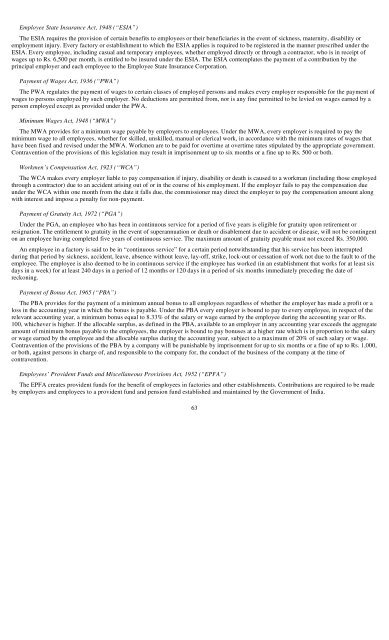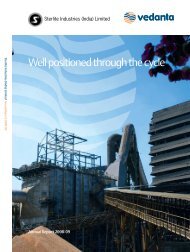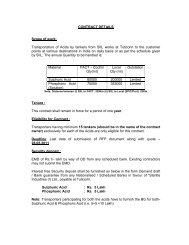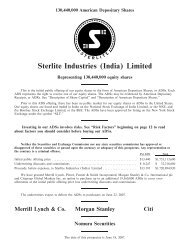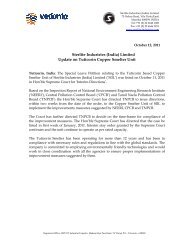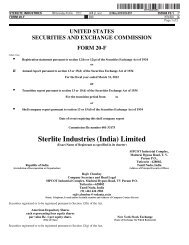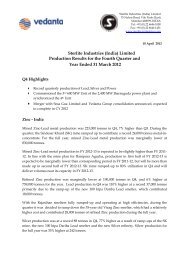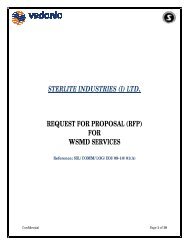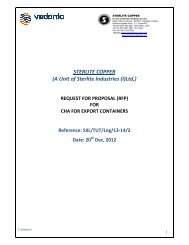Sterlite Industries (India) Limited - Sterlite Industries India Ltd.
Sterlite Industries (India) Limited - Sterlite Industries India Ltd.
Sterlite Industries (India) Limited - Sterlite Industries India Ltd.
Create successful ePaper yourself
Turn your PDF publications into a flip-book with our unique Google optimized e-Paper software.
Employee State Insurance Act, 1948 (“ESIA”)<br />
The ESIA requires the provision of certain benefits to employees or their beneficiaries in the event of sickness, maternity, disability or<br />
employment injury. Every factory or establishment to which the ESIA applies is required to be registered in the manner prescribed under the<br />
ESIA. Every employee, including casual and temporary employees, whether employed directly or through a contractor, who is in receipt of<br />
wages up to Rs. 6,500 per month, is entitled to be insured under the ESIA. The ESIA contemplates the payment of a contribution by the<br />
principal employer and each employee to the Employee State Insurance Corporation.<br />
Payment of Wages Act, 1936 (“PWA”)<br />
The PWA regulates the payment of wages to certain classes of employed persons and makes every employer responsible for the payment of<br />
wages to persons employed by such employer. No deductions are permitted from, nor is any fine permitted to be levied on wages earned by a<br />
person employed except as provided under the PWA.<br />
Minimum Wages Act, 1948 (“MWA”)<br />
The MWA provides for a minimum wage payable by employers to employees. Under the MWA, every employer is required to pay the<br />
minimum wage to all employees, whether for skilled, unskilled, manual or clerical work, in accordance with the minimum rates of wages that<br />
have been fixed and revised under the MWA. Workmen are to be paid for overtime at overtime rates stipulated by the appropriate government.<br />
Contravention of the provisions of this legislation may result in imprisonment up to six months or a fine up to Rs. 500 or both.<br />
Workmen’s Compensation Act, 1923 (“WCA”)<br />
The WCA makes every employer liable to pay compensation if injury, disability or death is caused to a workman (including those employed<br />
through a contractor) due to an accident arising out of or in the course of his employment. If the employer fails to pay the compensation due<br />
under the WCA within one month from the date it falls due, the commissioner may direct the employer to pay the compensation amount along<br />
with interest and impose a penalty for non-payment.<br />
Payment of Gratuity Act, 1972 (“PGA”)<br />
Under the PGA, an employee who has been in continuous service for a period of five years is eligible for gratuity upon retirement or<br />
resignation. The entitlement to gratuity in the event of superannuation or death or disablement due to accident or disease, will not be contingent<br />
on an employee having completed five years of continuous service. The maximum amount of gratuity payable must not exceed Rs. 350,000.<br />
An employee in a factory is said to be in “continuous service” for a certain period notwithstanding that his service has been interrupted<br />
during that period by sickness, accident, leave, absence without leave, lay-off, strike, lock-out or cessation of work not due to the fault to of the<br />
employee. The employee is also deemed to be in continuous service if the employee has worked (in an establishment that works for at least six<br />
days in a week) for at least 240 days in a period of 12 months or 120 days in a period of six months immediately preceding the date of<br />
reckoning.<br />
Payment of Bonus Act, 1965 (“PBA”)<br />
The PBA provides for the payment of a minimum annual bonus to all employees regardless of whether the employer has made a profit or a<br />
loss in the accounting year in which the bonus is payable. Under the PBA every employer is bound to pay to every employee, in respect of the<br />
relevant accounting year, a minimum bonus equal to 8.33% of the salary or wage earned by the employee during the accounting year or Rs.<br />
100, whichever is higher. If the allocable surplus, as defined in the PBA, available to an employer in any accounting year exceeds the aggregate<br />
amount of minimum bonus payable to the employees, the employer is bound to pay bonuses at a higher rate which is in proportion to the salary<br />
or wage earned by the employee and the allocable surplus during the accounting year, subject to a maximum of 20% of such salary or wage.<br />
Contravention of the provisions of the PBA by a company will be punishable by imprisonment for up to six months or a fine of up to Rs. 1,000,<br />
or both, against persons in charge of, and responsible to the company for, the conduct of the business of the company at the time of<br />
contravention.<br />
Employees’ Provident Funds and Miscellaneous Provisions Act, 1952 (“EPFA”)<br />
The EPFA creates provident funds for the benefit of employees in factories and other establishments. Contributions are required to be made<br />
by employers and employees to a provident fund and pension fund established and maintained by the Government of <strong>India</strong>.<br />
63


